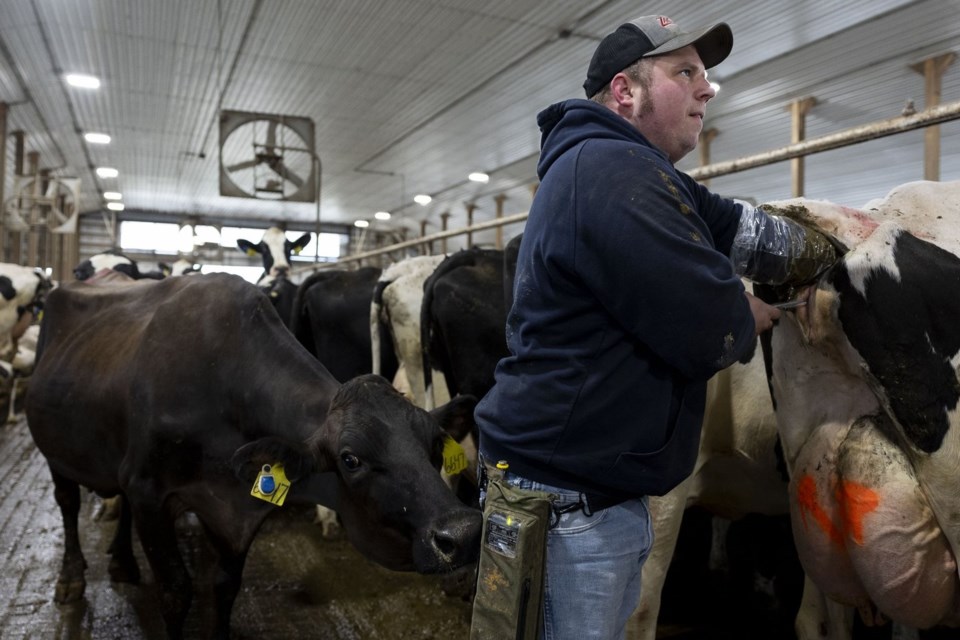SKANEATELES, N.Y. (AP) — Farmer Jeremy Brown taps the nose of a young calf. “I love the ones with the pink noses,” he says.
This pink-nosed animal is just one of about 3,200 cattle at Twin Birch Dairy in Skaneateles, New York. In Brown’s eyes, the cows on the farm aren’t just workers: “They’re the boss, they’re the queen of the barn.”
Brown, a co-owner at Twin Birch, is outspoken on the importance of sustainability in his operation. The average dairy cow emits as much as 265 pounds (120 kilograms) of methane, a potent climate-warming gas, each year. Brown says Twin Birch has worked hard to cut its planet-warming emissions through a number of environmentally sound choices.
“Ruminants are the solution, not the problem, to climate change,” he said.
___
EDITOR’S NOTE: This story is a collaboration between Rochester Institute of Technology and The Associated Press.
___
Wearing a weathered hoodie and a hat promoting a brand of cow medicine, Brown was spending a windy Friday morning artificially inseminating some of the farm’s massive Jerseys and Holsteins. He stepped over an electric manure scraper used to clean the animals' barn.
The electric scraper means the dairy doesn't have to use a fuel-burning machine for that particular job. Twin Birch also recycles manure for use on crops, cools its milk with water that gets recirculated for cows to drink and grows most of its own feed.
Despite all that, the farm has no desire to pursue a U.S. Department of Agriculture organic certification, Brown said. Doing so would add costs and require the farm to forego technology that makes the dairy business, and ultimately the customer’s jug of milk, more affordable, he said.
He raises a question many farmers have been asking: Is organic farming just a word?
Declining enthusiasm for the organic certification
An increasing number of American farmers think so. America’s certified organic acreage fell almost 11% between 2019 and 2021. Numerous farmers who implement sustainable practices told The Associated Press that they have stayed away from the certification because it’s costly, doesn’t do enough to combat climate change and appears to be losing cachet in the marketplace. Converting an existing farm from conventional to organic agriculture can cost tens of thousands of dollars and add labor costs.
The rules governing the National Organic Program were published in 2000, and in the years after, organic farming boomed to eventually reach more than 5 million acres. But that has been declining in recent years.
Any downward trend is significant, as organic farms make up less than 1% of the country's total acreage, and organic sales are typically only a tiny share of the nationwide total.
Shannon Ratcliff, a farmer and co-owner of organically certified Shannon Brook Farms in Watkins Glen, New York, attributes the decline to a 2018 fraud case in Iowa involving a farmer selling grain mislabeled as certified organic. “The whole thing went crazy — work requirements for farmers ramped up and inspection levels were higher,” she said.
It's also just a tough business, Ratcliff said.
Her co-owner, Walter Adam, also thinks younger generations' interest in farming of any kind is also declining.
“It takes six months to learn everything,” Adam said. “We can’t find anybody as willing to work on the farm.”
Adam drives to Manhattan each week to sell their meat and eggs at markets, and spends Sunday mornings helping Ratcliff with business at the Brighton Farmers Market in Brighton, New York.
Frank Mitloehner, a professor in animal science in the College of Agricultural and Environmental Sciences at University of California Davis, said lack of flexibility and efficiency are driving farmers away from organic in an era of rising prices for farmers. He said organic standards need to be overhauled or the marketplace risks organic going away completely.
“I am in awe that so many organic farmers were able to produce that way for that long,” he said. “It seems that they are losing consumer base in these financially troubling times.”
But the label still matters to some buyers
Still, there are consumers determined to buy organic. Aaron Swindle, a warehouse employee at a chain supermarket, spends every Sunday morning shopping for organic groceries at the Brighton Farmers Market.
“The taste quality is different when it’s growing nearby,” Swindle said. He calls the Finger Lakes of New York a “trifecta,” a region that contributes dairy, produce, and meat for its residents.
John Bolton, owner of Bolton Farms in Hilton, New York, said he has some reservations about organic certification, but he’s pursuing it for his hydroponic farm, which grows produce in nutrient-rich water instead of soil. It produces greens such as kale and chard and is popular as a supplier for restaurants in western New York, and draws waves of regular customers at the Rochester Public Market on weekends.
Bolton doesn’t use pesticides. On a chilly day this spring, he was at his greenhouse unloading 1,500 ladybugs to do the work of eliminating the operation’s aphids. That's the kind of practice organic farms use to earn the certification, he said.
He said his operations aren’t immune to the dangers posed by climate change. Abnormally hot days affect their greenhouse, he said: “It’s devastating to not only the people but the plants."
But Bolton described the organic certification as economically and environmentally beneficial to his farm. Getting the certification will carry an expense, but he is confident it will be worth the price.
“It helps with sales. And you feel good about it – you’re doing the right practices,” Bolton said.
___
The Associated Press’ climate and environmental coverage receives financial support from multiple private foundations. AP is solely responsible for all content. Find AP’s standards for working with philanthropies, a list of supporters and funded coverage areas at AP.org.
Caitlyn Daproza Of Rochester Institute Of Technology And Patrick Whittle Of , The Associated Press



